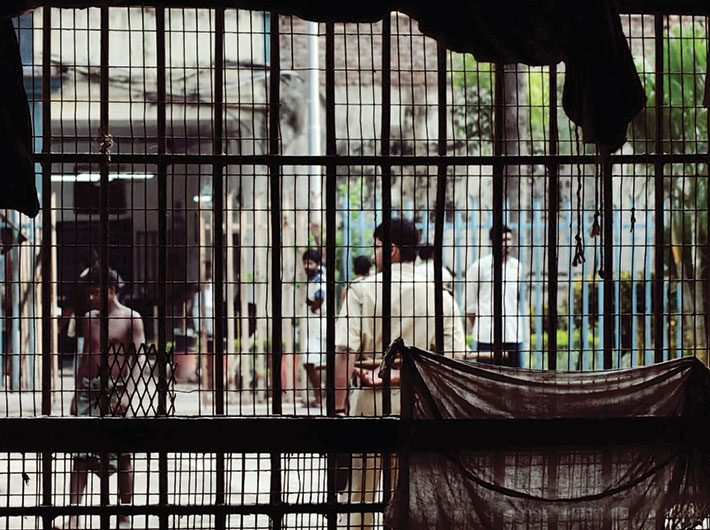They might be innocent, they might be guilty, but their trial is pending and they spend years in jail. A simple measure of setting up review committees can change their lives
Manoj has been in prison for the last four years, even though he was a juvenile at the time of his arrest. Johra, a foreign national, languishes in prison even after the completion of her sentence. Pradip was detained for 12 years in prison before being acquitted of all charges. Shamina, a victim of trafficking, is being tried as an offender. Tarun has been detained for five years as an undertrial as he is unrepresented in his trial. They are among the hundreds of undertrial prisoners who are detained unnecessarily in prisons across India.
The home minister’s recent letter to all state governments, asking them to set up state-level multi-disciplinary committees to review cases of undertrials, is one of the innumerable efforts made by the centre to give them a ray of hope. This is the third time since 2011 that the home ministry has called upon the states to form undertrial review committees (URC), also stressing on the need for prison reforms.
At the end of 2012 close to two crore criminal cases were pending in the district and subordinate courts in India. As a result, about 23 percent of the undertrial people remain in detention for more than a year in various prisons across India. This alone speaks volumes about the inadequacy of the criminal justice system. Among other reasons, this inadequacy can be attributed to unnecessary arrests by police, tendency of the magistracy to strictly follow procedural safeguards, lack of early access to counsel, lack of infrastructure, and inadequate court management. The Indian judicial system is struggling to uphold the constitutional promises. Speedy trial, presumption of innocence, and due process rights have become a farce today. With confidence in the criminal justice system at an all-time low, something needs to be done.
Why undertrial review committee
The purpose of creating URC is not to highlight the maladies but to ensure remedies, to safeguard individual liberty and to guarantee fair trial rights, especially to the unrepresented and the unfortunate.
The mandate of such review committees is very clear: to frequently review the cases of prisoners awaiting trial and apply appropriate correctives to ensure no undertrial is held for unjustifiably long periods in detention or is simply lost in the files. Attention is given to persons who become eligible to be released on bail, have already served a half or the maximum jail term for their offence, lack access to counsel, are vulnerable due to mental and physical disability, are accused of serious offences and have been undertrial for a long time or have committed such a petty offence that there is no need to keep them in judicial custody.
Be it cases of preventive detention, petty offences or illegal immigrants, they do not require the accused to be sent off to prison for countless years. Yet with the lack of review mechanisms to oversee their detention they end up in prison for years on end.
When URC
Review committees have been under discussion since April 1979 when a conference of chief secretaries recommended for the first time the constitution of district and state level review committees. Since then, the central government as well as the higher judiciary have remained steadfast in their support of an oversight mechanism. The all-India jail reforms committee of 1980-83, popularly known as the Mulla committee, also recommended an effective mechanism of review of the cases of undertrial prisoners regularly both at the district level and the state level.
The district level committee (Kerala), core committee (Gujarat), undertrial review committee (Himachal Pradesh) or Avadhik Samiksha Samiti (Rajasthan) as they are called, are much needed today. In Rajasthan, Himachal Pradesh and Kerala they were instituted by a government order. Whereas in Odisha and West Bengal their creation is pending at the home department, in Karnataka the prison department awaits action from the high court. There are still a few states which are oblivious to the idea.
Who of URC
URC is an excellent inter-agency coordinating body that allows for all relevant persons to come together to assist the courts in ensuring that there is no unjustifiable infringement of the right to liberty to which we are all entitled. In Rajasthan, for instance, the Avadhik Samiksha Samiti comprises various officers from the government, police, prison and probation department, and is headed by the chief judicial magistrate. In Gujarat, in addition to others, a civil surgeon, a district education officer, a social defence officer and representatives of the public works department and municipality also form part of the core committee. While in Himachal Pradesh and Kerala, these committees are headed by a district and sessions judge, in Andhra Pradesh, Haryana and Chandigarh absence of a formal review mechanism is compensated by a strong judicial oversight by district judges.
In the matter of constitution of such committees, the home minister’s letter introduces a fresh approach by providing for a member of civil society in the committees. This acknowledges the role civil society can play in ensuring accountability and transparency in the system.
The likes of A Raja, Sanjay Dutt and Lalu Prasad can afford effective lawyers, but what about others who at every step are treated unfairly by a system which chooses to detain and forget? With the home minister reiterating the need to set up review committees, we can but hope that the state governments will take action at the earliest. It will be a major step towards ushering much-needed reforms in the system.
Mathur and Dhanuka are with the Prison Reforms Programme, Commonwealth Human Rights Initiative.
